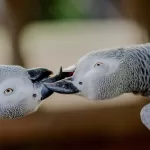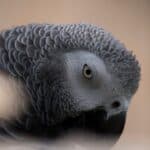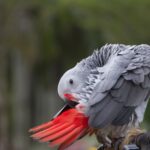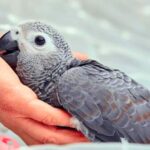This article will answer some of the most frequently asked questions about African Grey Parrots. The information will be valuable for existing owners of greys and also for those who are planning to have one.
I have covered everything about greys from how to why and discuss about what are the most common misconceptions about African grey parrots in this blog, so grab your coffee, sit back and enjoy reading!
Are African grey parrots smart
Yes, African greys are considered to be one of the most intelligent species of parrots and one of the most intelligent birds overall. They are known for their exceptional cognitive abilities, problem-solving skills, and capacity for learning and mimicry.
These parrots are highly social and can form strong bonds with their owners. They have been observed using tools in the wild to obtain food, and in captivity, they can learn a wide variety of complex tasks and behaviors, including speaking and understanding human language.
Due to their intelligence and social nature, African grey parrots require a significant amount of mental stimulation and interaction to stay healthy and happy. They should be provided with toys, puzzles, and other enrichment activities to keep them engaged and prevent boredom.
Additionally, owners should spend time interacting with their grey parrot each day, providing training and socialization to help maintain their mental and emotional well-being.
Is African Grey parrot a good pet
These parrots can make good pets if they are well-cared for and socialized. These intelligent and social birds require a lot of mental and physical stimulation, as well as a consistent and loving environment. They are known for their ability to mimic human speech and other sounds and can be very affectionate and bonded with their owners.
However, they are also high-maintenance pets that require significant time and financial commitment. They have a long lifespan (up to 50 years or more if looked after well), so owning an African grey is a long-term commitment.
It’s important to do thorough research and consider whether an African grey parrot is the right pet for you before deciding to bring one into your home. It’s also essential to source your grey from a reputable breeder or rescue organization and to provide it with proper care, including a healthy diet, a spacious and safe living environment, and regular interaction and socialization.
How long do African greys live as pets
African Grey parrots can live for a long time as pets, with a lifespan of up to 50-70 years or more in captivity if looked after well. These intelligent and social birds require a lot of mental and physical stimulation and a consistent and loving environment to thrive.
Proper care, including a healthy diet, a spacious and safe living environment, and regular interaction and socialization, can help to ensure that your African Grey parrot lives a long and healthy life.
It’s important to keep in mind that owning an African grey is a long-term commitment, and it’s essential to be prepared to provide your bird with proper care and attention for many years. It’s also important to source your African Grey parrot from a reputable breeder or rescue organization and to be prepared to provide it with the care and attention it needs throughout its life.
Do African grey parrots talk
African Grey parrots are known for their exceptional ability to mimic human speech and other sounds. These intelligent and social birds have a natural inclination to vocalize and are often highly skilled at imitating words and phrases that they hear frequently.
However, not all African Grey parrots will learn to talk or mimic sounds to the same extent, and some may never develop this skill at all. It is important to note that African Grey parrots are not born knowing how to talk, and they require a lot of time, effort, and patience to learn.
To encourage your African Grey parrot to learn to talk, you can provide it with a lot of opportunities to hear and repeat words and phrases, and reward it with treats and positive reinforcement when it uses its voice.
It’s also important to give your African Grey parrot plenty of mental and physical stimulation, as this can help to keep its brain active and engaged. Keep in mind that African Grey parrots are highly sensitive and can be easily influenced by their environment, so it’s important to provide them with a consistent and supportive learning environment.
Why do African grey parrots talk
African grey parrots are known for their exceptional ability to mimic and learn human speech, as well as a wide range of sounds and noises. While the exact reason why grey parrots talk is not fully understood, it is believed that their ability to mimic and learn sounds may have evolved as a form of social communication in the wild.
In the wild, African grey parrots live in large flocks and communicate with each other using a variety of calls, including alarm calls, mating calls, and contact calls. It is believed that their ability to mimic sounds and learn new calls may have evolved as a way to strengthen social bonds and facilitate communication within the flock.
In captivity, African grey parrots often learn to mimic human speech and other sounds through social interaction and environmental stimulation. They are highly intelligent and curious birds, and they may learn to mimic sounds that they hear frequently or that are associated with positive or negative experiences.
While not all grey parrots will learn to talk or mimic human speech, many of these birds are capable of learning a wide range of sounds and vocalizations with proper training and socialization. Talking and mimicking may be a way for grey parrots to communicate and bond with their owners, as well as an expression of their intelligence and curiosity.
When can African grey parrot talk
These parrots are known for their impressive ability to mimic human speech and other sounds. However, the timing of when they start talking can vary from bird to bird.
In general, African grey parrots can begin to mimic sounds as young as 4 months old, but they may not start to say words until they are 6-12 months old. It’s important to note that not all grey Parrots will talk, and some may only learn a few words while others may have a large vocabulary.
The key to teaching your grey to talk is to provide plenty of positive reinforcement, such as treats or praise, when they make attempts to mimic sounds or words. You can also try repeating words or phrases to your bird consistently, so they begin to associate the sounds with their meanings.
Overall, with patience, persistence, and positive reinforcement, many African grey parrots can learn to talk and communicate with their owners.
What is the mental age of an African Grey parrot
It is difficult to determine the mental age of an African Grey parrot, as these intelligent and social birds have cognitive abilities that are different from those of humans. African Grey parrots are known for their exceptional ability to mimic human speech and other sounds and are highly skilled at learning and problem-solving. They are also very social and can form strong bonds with their owners.
However, it’s important to keep in mind that African Grey parrots are highly sensitive and can be easily influenced by their environment. They require a lot of mental and physical stimulation and a consistent and loving environment to thrive.
Providing your African Grey parrot with plenty of mental and physical stimulation, such as toys, puzzles, and interactive activities, can help to keep its brain active and engaged.
It’s also important to be aware of your African Grey parrot’s behavior and to provide it with a consistent and supportive living environment that meets its needs. If you are concerned about your African Grey parrot’s mental development or if it is exhibiting unusual behavior, it may be helpful to consult with a veterinarian or a certified bird behaviorist for guidance.
Are African grey parrots aggressive
African Grey parrots are generally not aggressive birds. However, like any animal, they can become aggressive under certain circumstances. African Grey parrots are intelligent and social birds that require a lot of mental and physical stimulation, as well as a consistent and loving environment. If they do not receive sufficient stimulation or if they feel threatened or stressed, they may exhibit aggressive behavior.
African Grey parrots can also become aggressive if they are not properly socialized or if they are not handled or trained respectfully and gently. It’s important to handle African Grey parrots with care and to establish clear boundaries and rules to prevent aggressive behavior.
It’s also important to provide your African Grey parrot with a safe and spacious living environment and to monitor its behavior for any changes that may indicate stress or discomfort.
Overall, African Grey parrots are generally gentle and affectionate birds that can make loving and rewarding pets when they are well-cared for and socialized.
Are African grey parrots good for beginners
African Grey parrots can be good pets for beginners, but they do require a lot of care and attention and may not be the best choice for everyone. These intelligent and social birds have a long lifespan and require a significant time and financial commitment.
They also have specific care requirements, including a healthy diet, a spacious and safe living environment, and regular interaction and socialization.
African Grey parrots can be demanding pets and may not be the best choice for people who are new to bird ownership or who do not have the time or resources to provide them with the care and attention they need.
It’s important to do thorough research and consider whether an African Grey parrot is the right pet for you before deciding to bring one into your home. It’s also essential to source your African Grey parrot from a reputable breeder or rescue organization and to be prepared to provide it with proper care.
Can African grey parrots be potty trained
It is possible to train African Grey parrots to use a designated area for urination and defecation, but it can be a challenging process. African Grey parrots are intelligent and social birds that have a natural inclination to vocalize and mimic sounds, but they do not have the same bladder control or cognitive abilities as humans and may not understand the concept of using a designated area for elimination.
To potty train your African Grey parrot, you can try placing a specific type of substrate (such as newspaper or a training pad) in a designated area and encouraging your bird to use that area for elimination. You can also reward your bird with treats and positive reinforcement when it uses the designated area correctly.
However, it’s important to keep in mind that potty training an African Grey parrot is a slow and gradual process that requires patience and consistent training.
It’s also important to keep in mind that African Grey parrots are highly sensitive and can be easily influenced by their environment, so it’s important to provide them with a consistent and supportive training environment.
If you are having difficulty potty training your African Grey parrot, it may be helpful to consult with a veterinarian or a certified bird behaviorist for guidance.
Are African grey parrots noisy
African Grey parrots can be noisy birds, especially if they are not properly socialized or if they do not receive sufficient mental and physical stimulation.
These intelligent and social birds have a natural inclination to vocalize and mimic sounds, and they can be very loud and persistent when they want attention or are excited. African Grey parrots may also make noise when they feel threatened or stressed, or when they are bored or lonely.
To minimize noise from your African Grey parrot, it’s important to provide it with a healthy diet, a spacious and safe living environment, and regular interaction and socialization. It’s also important to establish clear boundaries and rules and to provide your bird with plenty of mental and physical stimulation, such as toys, puzzles, and interactive activities.
It’s worth noting that African Grey parrots are highly sensitive and can be easily influenced by their environment, so it’s important to create a consistent and supportive living environment that meets their needs.
If you are concerned about noise from your African Grey parrot, it may be helpful to consult with a veterinarian or a certified bird behaviorist for guidance.
Can parrots be left alone for 8 hours
It is generally not recommended to leave parrots alone for 8 hours or more regularly. Parrots are social and intelligent birds that require a lot of mental and physical stimulation and attention from their owners.
They can become bored, lonely, and stressed if they are left alone for long periods, which can lead to negative behaviors such as feather plucking, excessive vocalization, and aggression.
If you need to leave your parrot alone for 8 hours or more, it’s important to provide it with plenty of mental and physical stimulation before you leave, such as toys, puzzles, and interactive activities. It’s also important to make sure your parrot has access to fresh food and water and to provide it with a safe and spacious living environment.
If you are unable to provide your parrot with the care and attention it needs daily, it may be necessary to arrange for someone to check in on your bird or to have a trusted friend or family member care for it while you are away. It’s also worth considering whether a parrot is a right pet for you before bringing one into your home.
Can parrot sleep in the bed
It is generally not recommended to allow parrots to sleep in your bed for several reasons. Parrots are intelligent and social birds that require a lot of mental and physical stimulation, and they may become bored or anxious if they are not provided with enough stimulation or if they are left alone for long periods.
Allowing a parrot to sleep in your bed could interfere with its sleep patterns and disrupt its natural behavior.
In addition, parrots have the potential to carry diseases that can be transmitted to humans, such as salmonella. While the risk of transmission can be minimized through proper hygiene practices, allowing a parrot to sleep in your bed could increase the risk of exposure.
It’s important to provide your parrot with a safe and spacious living environment that meets its needs and to establish clear boundaries and rules to prevent any behavior problems.
It’s also important to provide your parrot with plenty of mental and physical stimulation, such as toys, puzzles, and interactive activities, to keep it happy and healthy.
when do African grey parrots rest
African grey parrots, like all animals, require rest and sleep to maintain their health and well-being. In the wild, these parrots typically rest at night when it is dark, and they may take short naps during the day.
In captivity, grey parrots should be provided with a quiet, dark, and comfortable sleeping area to ensure that they are able to get adequate rest. It’s important to provide a consistent sleeping schedule for your bird to help establish a routine.
Grey parrots may also rest or nap during the day, particularly if they are feeling tired or have recently engaged in physical activity. It’s important to provide them with a safe and comfortable place to rest, such as a perch or nesting box.
It’s important to note that these parrots are social animals that require stimulation and interaction to maintain their mental and emotional health. While it’s important to provide them with adequate rest and sleep, it’s also important to ensure that they have plenty of opportunities for play, exercise, and socialization.
Are African greys messy birds
African Grey parrots can be messy birds, especially when they are eating or playing. These intelligent and social birds have a natural inclination to explore their environment and may scatter their food or toys around their living area. They also produce a lot of feathers, which can shed and create dust and debris.
To minimize mess from your African Grey parrot, it’s important to provide it with a spacious and safe living environment that is easy to clean, such as a large cage or aviary. It’s also important to keep your bird’s living area clean and well-maintained by cleaning up any food or debris regularly and by providing your bird with fresh water and a healthy diet.
It’s worth noting that African Grey parrots are highly sensitive and can be easily influenced by their environment, so it’s important to create a consistent and supportive living environment that meets their needs.
If you are concerned about the mess from your African Grey parrot, it may be helpful to consult with a veterinarian or a certified bird behaviorist for guidance.
Are African grey parrots high maintenance
African Grey parrots can be high-maintenance pets. These intelligent and social birds require a lot of mental and physical stimulation and a consistent and loving environment to thrive.
They also have specific care requirements, including a healthy diet, a spacious and safe living environment, and regular interaction and socialization.
African Grey parrots are known for their exceptional ability to mimic human speech and other sounds, and they can be very affectionate and bonded with their owners.
However, they are also demanding pets that require a significant time and financial commitment. They have a long lifespan, so owning an African Grey parrot is a long-term commitment.
It’s important to do thorough research and consider whether an African Grey parrot is the right pet for you before deciding to bring one into your home. It’s also essential to source your African Grey parrot from a reputable breeder or rescue organization and to be prepared to provide it with proper care and attention for many years.
Do African grey parrots need baths
African Grey parrots do not typically need to be given baths in the same way that other pets, such as dogs and cats, do. These birds have a natural preening behavior that allows them to clean and groom their feathers regularly.
Preening helps African Grey parrots to remove dirt, parasites, and other debris from their feathers, as well as to maintain the health and integrity of their feathers.
However, African Grey parrots may enjoy being misted with water or having a shallow dish of water available for them to bathe in. Some African Grey parrots may also enjoy being sprayed with a fine mist of water from a spray bottle or having their feathers gently sponged with a damp cloth.
It’s important to keep in mind that African Grey parrots are highly sensitive and can be easily influenced by their environment, so it’s important to provide them with a consistent and supportive living environment that meets their needs.
If you are unsure about whether to bathe your African Grey parrot or how to do it safely, it may be helpful to consult with a veterinarian or a certified bird behaviorist for guidance.
What are African grey parrots scared of
African Grey parrots are intelligent and social birds that can be sensitive to their environment and may become frightened or stressed by certain stimuli. Some African Grey parrots may be afraid of loud noises, sudden movements, or unfamiliar people or animals.
They may also be afraid of being handled or touched in certain ways, or of being placed in unfamiliar or unfamiliar environments.
It’s important to be aware of your African Grey parrot’s behavior and to provide it with a consistent and supportive living environment that meets its needs.
If you notice that your African Grey parrot is afraid of certain stimuli or if it is exhibiting signs of stress or anxiety, it may be helpful to consult with a veterinarian or a certified bird behaviorist for guidance.
Some common signs of fear or stress in African Grey parrots may include hiding, feather fluffing, panting, or reduced appetite. It’s important to provide your African Grey parrot with a safe and spacious living environment and to handle it gently and respectfully to help prevent fear or stress.
Do African greys love their owners
African Grey parrots are intelligent and social birds that can form strong bonds with their owners and can be very affectionate and loving.
These birds are known for their exceptional ability to mimic human speech and other sounds and can be very bonded with their owners. African Grey parrots are also highly social and can thrive in environments where they receive regular interaction and socialization.
To help your African Grey parrot form a strong bond with you, it’s important to provide it with a consistent and loving environment and to spend time interacting with it regularly. This can include talking to it, playing with it, and providing it with mental and physical stimulation, such as toys, puzzles, and interactive activities.
It’s also important to be patient and consistent with your African Grey parrot and to handle it gently and respectfully.
Overall, African Grey parrots are generally loving and affectionate birds that can make rewarding pets when they are well-cared for and socialized.
Do African grey parrots have feelings
Like many animals, African Grey parrots are thought to have feelings and emotions, although it is difficult to determine the extent to which their feelings and emotions are similar to those of humans.
These intelligent and social birds have complex cognitive abilities and are known for their ability to form strong bonds with their owners and to exhibit a range of behaviors and expressions that may indicate different moods or emotions
African Grey parrots are highly sensitive and can be easily influenced by their environment, and they may exhibit a range of behaviors and expressions in response to different stimuli.
For example, they may show happiness through vocalizations or body language, or they may become anxious or stressed when exposed to unfamiliar or potentially threatening situations.
Overall, it is believed that African Grey parrots are capable of experiencing a range of emotions, and they may be able to form strong emotional bonds with their owners and other members of their social group.
It’s important to be aware of your African Grey parrot’s behavior and to provide it with a consistent and supportive living environment that meets its needs. If you are concerned about your African Grey parrot’s emotional well-being, it may be helpful to consult with a veterinarian or a certified bird behaviorist for guidance.
How do you punish an African GREY parrot
It is not recommended to punish African Greys or any other pets. Punishment can be stressful and confusing for birds and can cause them to become anxious, fearful, or aggressive.
Instead of punishment, it’s important to establish clear boundaries and rules and to use positive reinforcement and rewards to encourage desired behaviors in your African Grey parrot.
To train your African Grey parrot, you can use treats and praise to reward it for good behavior and to encourage it to repeat those behaviors in the future. It’s important to be consistent and patient and to use positive reinforcement consistently to help your African Grey parrot learn.
It’s also important to provide your African Grey parrot with plenty of mental and physical stimulation, such as toys, puzzles, and interactive activities, to keep it happy and engaged.
Providing your African Grey parrot with a consistent and loving environment and handling it gently and respectfully can also help to prevent behavior problems.
If you are having difficulty training your African Grey parrot or if you are concerned about its behavior, it may be helpful to consult with a veterinarian or a certified bird behaviorist for guidance.
What should you not do to a parrot
There are several things that you should not do to a parrot, including:
Do not neglect your parrot’s needs: Parrots are intelligent and social birds that require a lot of mental and physical stimulation, as well as a consistent and loving environment to thrive. It’s important to provide your parrot with a healthy diet, a spacious and safe living environment, and regular interaction and socialization.
Do not handle your parrot roughly or aggressively: Parrots are sensitive and can be easily frightened or stressed by rough handling or aggressive behavior. It’s important to handle your parrot gently and respectfully and to be aware of its body language and behavior.
Do not expose your parrot to harmful substances or loud noises: Parrots are sensitive to their environment and can be easily stressed or frightened by loud noises or exposure to harmful substances. It’s important to keep your parrot away from loud noises and to avoid exposing it to chemicals, smoke, or other potentially harmful substances.
Do not clip your parrot’s wings without proper training: Clipping a parrot’s wings can be a controversial issue, and it is important to carefully consider whether it is necessary and to consult with a veterinarian or a certified bird behaviorist before proceeding. If you do decide to clip your parrot’s wings, it’s important to do so in a way that does not harm the bird and to seek guidance from a veterinarian or a certified bird behaviorist.
Do not keep your parrot in a small or cramped living space: Parrots are intelligent and social birds that require a lot of mental and physical stimulation, as well as a spacious and safe living environment to thrive. It’s important to provide your parrot with a cage or aviary that is large enough for it to move around and stretch its wings, as well as plenty of toys and interactive activities to keep it mentally and physically stimulated.
By following these guidelines and providing your parrot with proper care and attention, you can help ensure that it stays happy and healthy. If you are unsure about how to care for your parrot or if you have any concerns about its behavior, it may be helpful to consult with a veterinarian or a certified bird behaviorist for guidance.
How do you shut a parrot up?
It is not appropriate or humane to try to “shut a parrot up” or to prevent it from vocalizing. Parrots are intelligent and social birds that have a natural inclination to vocalize and mimic sounds, and they may vocalize for a variety of reasons, including to communicate with their owners or other members of their social group, to express excitement or joy, or to alert others to potential threats.
To minimize noise from your parrot, it’s important to provide it with a healthy diet, a spacious and safe living environment, and regular interaction and socialization.
It’s also important to establish clear boundaries and rules and to provide your parrot with plenty of mental and physical stimulation, such as toys, puzzles, and interactive activities, to keep it happy and engaged.
If you are having difficulty managing noise from your parrot or if you are concerned about its behavior, it may be helpful to consult with a veterinarian or a certified bird behaviorist for guidance. They can help you to understand your parrot’s behavior and to identify any potential underlying causes for excessive vocalization.
Do parrots like it when you kiss them?
It is not uncommon for parrots to show affection to their owners through physical contacts, such as preening or snuggling. However, it’s important to keep in mind that each parrot is an individual and may have its preferences when it comes to physical affection. Some parrots may enjoy being kissed or snuggled, while others may not.
It’s important to pay attention to your parrot’s body language and behavior and to respect its boundaries.
If your parrot is showing signs of discomfort or if it is trying to avoid physical contact, it’s important to respect its wishes and to provide it with other forms of affection, such as talking to it, playing with it, or providing it with mental and physical stimulation.
It’s also important to handle your parrot gently and respectfully and to be mindful of its beak, which can be sharp and powerful. If you are unsure about how to show affection to your parrot or if you have any concerns about its behavior, it may be helpful to consult with a veterinarian or a certified bird behaviorist for guidance.
How often do African grey parrots poop
African Grey parrots, like all birds, poop quite frequently. The frequency of their bowel movements can vary depending on several factors, including their diet, activity level, and size. On average, African Grey parrots may poop every 10 to 30 minutes.
It’s important to note that regular pooping is a sign of good health for birds, and owners should monitor their pet’s bowel movements to ensure that they are regular and consistent in size and texture. Any changes in the frequency, color, or consistency of a bird’s poop could be a sign of an underlying health issue, and owners should seek veterinary attention if they notice any abnormalities.
Why do African grey parrots puff up
African grey parrots may puff up their feathers for a variety of reasons, including to regulate their body temperature, express emotion, or show off their size and dominance.
One reason why grey parrots puff up their feathers is to regulate their body temperature. By puffing up their feathers, they can trap warm air close to their skin and conserve body heat in colder temperatures. Similarly, in hotter temperatures, they may puff up their feathers to increase airflow and release heat.
Another reason why African grey parrots puff up their feathers is to express emotion. When they are feeling threatened or stressed, they may puff up their feathers to make themselves appear larger and more intimidating. Conversely, when they are feeling relaxed or content, they may puff up their feathers as a sign of comfort and security.
Also, African grey parrots may puff up their feathers to show off their size and dominance. In the wild, males may puff up their feathers to attract females or intimidate rivals, while females may puff up their feathers to signal their readiness to mate.
Overall, puffing up is a natural behavior for African grey parrots and can be a sign of a healthy and content bird. However, if a parrot appears puffed up for extended periods of time or exhibits other signs of illness or distress, it’s important to seek advice from a qualified avian veterinarian.
When do African grey parrots mate
These parrots typically reach sexual maturity at around 3-5 years of age. In the wild, they usually mate during the rainy season, which typically occurs between April and June.
In captivity, grey parrots may mate throughout the year if they are provided with the appropriate nesting materials and environmental conditions. However, it’s important to note that breeding should only be undertaken by experienced breeders who are prepared to provide the necessary care and attention to the birds and any resulting offspring.
Breeding African Greys can be a complex process that requires careful consideration of many factors, including the birds’ health, genetics, and temperament, as well as the availability of appropriate nesting materials and the appropriate environment. It’s important to consult with a qualified avian veterinarian or experienced breeder before attempting to breed African grey parrots.
How long do grey parrot eggs take to hatch
African grey parrot eggs typically take about 28 to 30 days to hatch, from the time the female lays the eggs until they hatch. During this time, the female grey parrot will incubate the eggs to keep them warm and help them develop properly.
It’s important to note that breeding grey parrots requires a significant amount of knowledge and expertise, as there are many factors that can affect the success of the breeding process, including diet, temperature, humidity, and other environmental factors.
Breeding should only be undertaken by experienced individuals who have a thorough understanding of the process and are able to provide the proper care and support to the birds.
How often do African grey parrots lay eggs
These parrots have the ability to lay eggs year-round, but the frequency of egg-laying can vary depending on various factors such as diet, age, and breeding conditions.
In the wild, grey parrots typically breed during the rainy season, which varies by region. In captivity, if the conditions are suitable, they may lay eggs more frequently than in the wild.
Some female grey parrots may lay eggs even if they have not mated with a male. This is known as “chronic egg-laying” and can occur if the bird is hormonal, stressed, or has inadequate nutrition. Chronic egg-laying can lead to health problems, including calcium deficiency and egg binding, which is why it’s important to ensure your parrot has a healthy diet and is not under stress.
It’s essential to provide your grey parrot with a healthy diet, plenty of exercise, and a comfortable and stimulating environment to prevent chronic egg-laying and promote overall health and well-being.
Where do African grey parrots sleep
These parrots typically sleep on a perch at night. In the wild, they may roost in trees or other high places, and in captivity, they will often sleep on a wooden or metal perch provided by their owner.
It’s important to provide your African grey parrot with a comfortable and safe sleeping environment. This means providing a perch that is the appropriate size for your bird and ensuring that it is securely fastened to the cage. You should also ensure that the cage is located in a quiet, dark area of your home at night, as parrots can be disturbed by noise and light.
It’s important to note that African Grey parrots require a consistent sleep schedule and need around 10 to 12 hours of sleep each night to maintain their health and well-being. Providing a comfortable and safe sleeping environment is an important part of ensuring that your African Grey parrot gets the rest it needs to stay healthy and happy.
What African grey parrots eat
In the wild, grey parrots primarily feed on a variety of nuts, seeds, fruits, and vegetables. In captivity, it’s important to provide them with a balanced and varied diet that meets their nutritional needs.
African grey parrots require a diet that is high in fiber, protein, vitamins, and minerals, and low in fat and sugar. A healthy diet for an African Grey parrot may include:
Pellets: High-quality pellets specifically formulated for grey parrots should make up the bulk of their diet. Pellets provide a balanced mix of essential nutrients, including vitamins, minerals, and amino acids.
Fresh fruits and vegetables: Fresh fruits and vegetables should also be a regular part of an grey parrot’s diet. They should be washed thoroughly and cut into bite-sized pieces. Good options include leafy greens like kale and spinach, as well as carrots, broccoli, apples, and berries.
Nuts and seeds: While nuts and seeds should not make up the majority of grey parrot’s diet, they can be offered as a treat or used for training purposes. Good options include almonds, walnuts, and sunflower seeds.
Grains: Cooked grains like quinoa and brown rice can also be offered as part of grey parrot’s diet.
It’s important to avoid feeding grey parrots foods that are toxic or unhealthy for them. This includes chocolate, caffeine, alcohol, avocado, and high-fat or sugary foods.
Additionally, these parrots require access to clean, fresh water at all times. Water should be changed daily, and their water dish should be washed regularly to prevent the growth of bacteria.
Consulting with a qualified avian veterinarian can help ensure that your grey is receiving a healthy and balanced diet that meets their specific nutritional needs.
Can a parrot fall in love with a human?
Parrots are intelligent and social birds that are capable of forming strong bonds with their owners and other members of their social group. Some parrots may show affection to their owners through physical contact, such as preening or snuggling and may become attached to their owners over time.
However, it’s important to keep in mind that each parrot is an individual and may have its preferences and behaviors when it comes to affection. Some parrots may be more affectionate than others, and it’s important to pay attention to your parrot’s body language and behavior and to respect its boundaries.
It’s also important to provide your parrot with a consistent and loving environment and to spend time interacting with it regularly. This can help to strengthen the bond between you and your parrot and to foster a positive and rewarding relationship.
If you are concerned about your parrot’s emotional well-being or if you have any questions about its behavior, it may be helpful to consult with a veterinarian or a certified bird behaviorist for guidance.
Will African grey parrot fly away
Yes, African grey parrots are capable of flying and can potentially fly away if they are not kept in a secure environment. Greys are highly intelligent and curious birds, and they may attempt to fly away in search of new experiences or if they feel threatened or frightened.
To prevent an African grey from flying away, it’s important to provide them with a secure and appropriate living environment. This includes a spacious cage or aviary with plenty of room for exercise and play, as well as regular opportunities for supervised out-of-cage time. When letting an grey out of their cage, it’s important to supervise them closely and make sure all doors and windows are closed.
Additionally, African grey parrots should be trained and socialized from a young age to ensure that they are comfortable and well-behaved in their environment. This may include training them to come when called, step up onto your hand, and follow basic commands.
If an African grey parrot does fly away, it’s important to act quickly to try and locate them. This may include putting up flyers, contacting local bird clubs or rescue organizations, and searching the area where they were last seen. With proper care and attention, however, it is possible to keep grey parrot safely contained and prevent them from flying away.
Where to buy African grey parrot
If you are interested in buying an African grey parrot, it is important to do your research and ensure that you are purchasing from a reputable breeder or pet store. You should look for a breeder or store that specializes in parrots, has a good reputation, and provides a healthy and safe environment for their birds.
One way to find a reputable breeder or store is to search online for reviews and recommendations from other parrot owners. You can also contact local parrot clubs or organizations for advice on where to buy an African Grey parrot.
It’s important to note that buying a parrot is a serious commitment, as these birds can live for many decades and require a significant amount of care and attention. Before making a purchase, be sure that you have the time, resources, and knowledge necessary to provide for your new pet’s needs.
How much African Greys cost?
The cost of an African grey parrot can vary greatly depending on a number of factors, including its age, sex, pedigree, and overall health. On average, you can expect to pay anywhere from $700 to $1,500 for a well-bred African grey parrot.
However, prices can range from as low as $500 to as high as $10,000 or more for a particularly rare or high-quality specimen. It’s important to do your research and shop around to find the best price and ensure that you are getting a healthy, well-cared-for bird.
You should also be prepared to pay for ongoing expenses such as food, toys, and veterinary care. Owning a parrot can be a rewarding and enjoyable experience, but it is also a big responsibility that requires a significant financial investment.
Prices vary widely, so be sure to shop around before buying one! I wrote a complete article about it, you can read it here and of course after reading this article. 🙂
How Much Does An African Grey Weigh?
African grey parrots are medium-sized parrots that typically weigh between 400 and 600 grams, or about 14 to 21 ounces. The size and weight of an individual African grey parrot can vary depending on factors such as its age, sex, and diet.
Adult females tend to be slightly larger and heavier than males, and well-fed birds may weigh more than those that are undernourished. African grey parrots have a robust, stocky build and are known for their striking grey feathers, which may have a slight sheen or iridescent quality.
Are African grey parrots illegal
No, Grey parrots are not illegal in most countries, but there are regulations in place to protect the wild population and ensure that captive birds are properly cared for.
In some countries, such as the United States, it is legal to own an African grey parrot as a pet, but there may be restrictions on importing or exporting the birds, and owners may be required to obtain permits or licenses to keep them.
However, it’s important to note that the illegal trade in grey parrots is a significant problem, as these birds are highly valued for their intelligence and ability to mimic human speech. Illegal trapping and trade in African Grey parrots can have a devastating impact on wild populations, and consumers should be aware of the risks associated with purchasing birds that may have been illegally obtained.
To ensure that you are obtaining a legally acquired African Grey parrot, it’s important to purchase from a reputable breeder or pet store that can provide documentation of the bird’s origin and ensure that it has been legally acquired. Additionally, it’s important to support efforts to protect wild populations of African Grey parrots and promote responsible ownership and care of these intelligent and fascinating birds.
How many African grey parrots are left in the world
The wild population of African grey parrots has declined significantly over the past few decades due to habitat loss and the illegal trade in these birds. However, it’s difficult to estimate the exact number of grey parrots left in the world, as population estimates vary widely depending on the region and the specific species.
According to the International Union for Conservation of Nature (IUCN), the Congo African Grey parrot (Psittacus erithacus erithacus) is considered endangered, with a population decline of more than 50% over the past few decades. The Timneh African Grey parrot (Psittacus timneh) is considered vulnerable, with a declining population trend.
Conservation efforts are underway to protect wild populations of African grey parrots and prevent illegal trade in these birds. It’s important to support these efforts and ensure that captive birds are properly cared for to help preserve these intelligent and fascinating birds for future generations.
Are African grey parrot endangered
Yes, African grey parrots are considered to be endangered due to habitat loss and the illegal trade in these birds. As I mentioned above there are two subspecies of African Grey parrot: the Congo African Grey (Psittacus erithacus erithacus) and the Timneh African Grey (Psittacus timneh), and both are listed as endangered or vulnerable by the International Union for Conservation of Nature (IUCN).
The wild population of African grey parrots has declined significantly over the past few decades due to habitat loss, poaching, and the illegal trade in these birds for the pet trade. These parrots are highly valued for their intelligence and ability to mimic human speech, and they are one of the most commonly traded bird species in the world.
Conservation efforts are underway to protect wild populations of African grey parrots and prevent illegal trade in these birds. It’s important to support these efforts and ensure that captive birds are properly cared for to help preserve these intelligent and fascinating birds for future generations.
What are the most common misconceptions about African grey parrots?
There are a number of misconceptions about African grey parrots that are commonly held by people who are not familiar with these intelligent and social birds. Here are a few of the most common misconceptions about African grey parrots:
Misconception: African grey parrots are easy to care for. In reality, African grey parrots require a lot of care and attention. They need a varied diet, a large cage, and plenty of opportunities for social interaction and mental stimulation.
Misconception: African grey parrots can talk just like humans. While African grey parrots are known for their ability to mimic human speech and other sounds, they do not have the same language abilities as humans.
Misconception: African grey parrots are aggressive. While they can be protective of their mates and territory, they are generally not aggressive birds. However, they may exhibit aggressive behavior if they are not properly socialized or if they feel threatened.
Misconception: African grey parrots are easy to potty train. Potty training a parrot can be a challenging process, and it is not always successful. African grey parrots, like all parrots, are prone to messy behaviors, and it may take time and patience to teach them to use a designated bathroom area.
Misconception: African grey parrots are low maintenance pets. African grey parrots require a lot of care and attention, and they can be demanding pets. They need a varied diet, plenty of toys and activities to keep them mentally stimulated, and regular grooming and medical care.
What is the friendliest talking parrot?
There are many different species of parrots that are known for their ability to talk or mimic human speech, and it’s difficult to determine which species is the “friendliest.” Some popular species of parrots that are known for their talking ability include:
African Grey parrots: These intelligent and social birds are known for their exceptional ability to mimic human speech and other sounds and are highly skilled at learning and problem-solving. They are also very social and can form strong bonds with their owners.
Amazon parrots: These social and playful birds are known for their ability to mimic human speech and are highly skilled at learning and problem-solving. They are also very social and can form strong bonds with their owners.
Indian Ring-Necked parrots: These intelligent and social birds are known for their ability to mimic human speech and other sounds and are highly skilled at learning and problem-solving. They are also very social and can form strong bonds with their owners.
Quaker parrots: These social and playful birds are known for their ability to mimic human speech and are highly skilled at learning and problem-solving. They are also very social and can form strong bonds with their owners.
It’s important to keep in mind that all parrots are individuals and may have their unique personalities and behaviors. It’s important to do thorough research and to consider whether a particular species of parrot is the right fit for your lifestyle and needs before deciding to bring one into your home.
If you found this blog helpful, It would be great if you could share it with your family and friends who might find it useful as well.
For more useful content about African Grey parrots, you can subscribe my site with your email to get notification upon publishing a new blog, the subscribe box you can see on the right side of this page. Also if you get an alert on your web browser while browsing my site, allow it and that will also give you an alert whenever I publish a new blog. 🙂
You might like to read these:
Frequently Asked Questions About African Grey Parrot Toys
The Surprising Benefits of Owning an African Grey Parrot
Unlock the Secrets of Choosing the Perfect African Grey Parrot
The Art of Training Your African Grey Parrot
African Grey Parrot Male or Female? (Determine Gender of African Grey)
The Importance of a Cage for Your African Grey Parrot
Uncover the Fascinating World of Parrot Tongue Anatomy and Function
Is Your African Grey a Jealous Bird? Here’s What You Need to Know!
Stay safe and much love !













